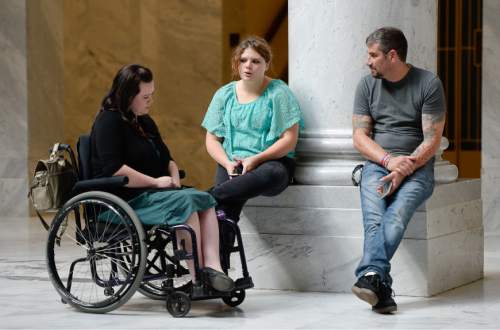This is an archived article that was published on sltrib.com in 2015, and information in the article may be outdated. It is provided only for personal research purposes and may not be reprinted.
"If power corrupts, weakness in the seat of power, with its constant necessity of deals and bribes and compromising arrangements, corrupts even more."
— Barbara Tuchman, "The March of Folly"
The utterly shameful — and, for some of us, literally deadly — failure of Utah's political leaders to fashion their own workable version of the federal Affordable Care Act is clearly the result of leaders who will not, or cannot, lead.
A governor who can write a Medicaid alternative but not sell it to a Legislature overwhelmingly dominated by members of his own Republican Party.
A House speaker who craves nothing more than multiple layers of political cover to obscure the fact that his caucus is more beholden to Koch Brothers propaganda than to the better angels of their own constituents' nature.
A Senate leadership made up of the only grown-ups in the room, who are still unable to help others see both the humanity and the economic benefits of their plans.
It is understandable that Gov. Gary Herbert, having twice run into the brick wall of House recalcitrance to approve either his Healthy Utah plan or its tweaked alternative, Utah Access Plus, has apparently thrown up his hands and passed the buck to the Legislature. Understandable, but not helpful.
Of course, Herbert is also the "leader" who, in apparent panic mode over a pending challenge from his right flank, moved to cancel several state contracts with Planned Parenthood based on fraudulent videos involving people who have nothing to do with the local chapter or its essential activities. (That move has been blocked, at least temporarily, by a federal judge who found reason to suspect Herbert was acting politically rather than reasonably.)
House Speaker Greg Hughes, meanwhile, has proven to be the John Boehner of Utah, unable to lead his chamber to do anything resembling governing and blaming his members, the federal government, the state's medical establishment, everyone but himself, for the House's colossal collapse.
After the failure of Healthy Utah in the last session of the Legislature, Herbert, Hughes and the rest of the so-called Gang of Six leaders concocted a new plan, Utah Access Plus, which differed from Healthy Utah mostly in that it expected the medical establishment to carry much of the state's cost. But, instead of carrying the day, Access Plus was barely considered by the GOP House caucus and died a quick death.
In the short run, only a handful of the many Utahns who still lack the kind of health care access that even the poorest citizens of civilized nations have long taken for granted are likely to be helped by a thin gruel of reform called — in a case of false advertising blatant enough to warrant the attention of the Federal Trade Commission — Utah Cares.
In the long term, the best hope for the people of Utah to have a state government that serves them, that hears them, that values them at all, is to fully implement and stand by the electoral reforms created in response to the Count My Vote initiative.
Those reforms, which will open the Republican nominating process to the whole of the party's electorate rather than just the right-wing true believers who have long dominated the caucus and convention system, are our best hope of electing legislators and governors who have the legitimacy to really govern, as well as a level of decency that reflects the populace as a whole, not the heartlessness of our current power structure.



